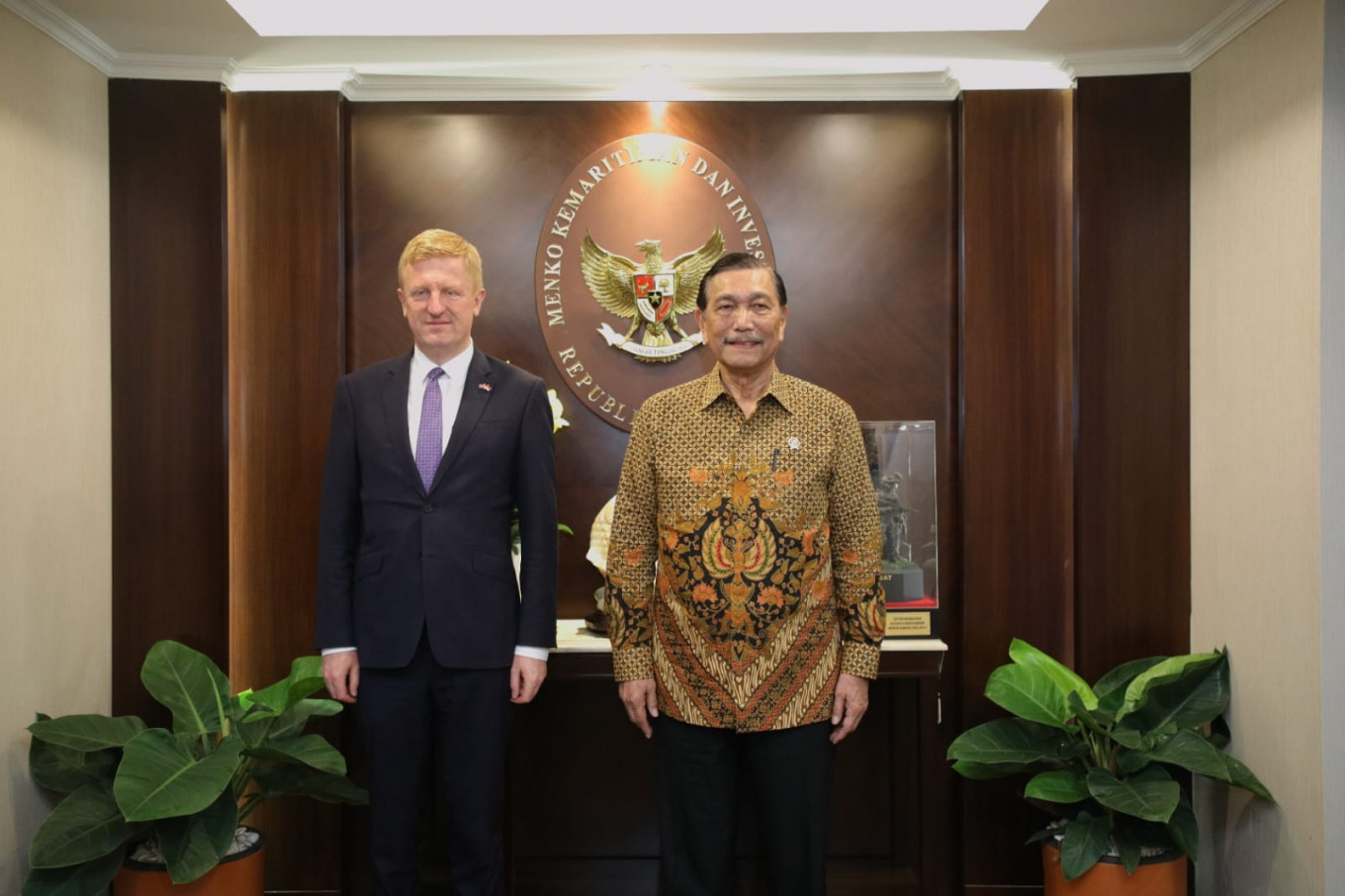Popular Reads
Top Results
Can't find what you're looking for?
View all search resultsPopular Reads
Top Results
Can't find what you're looking for?
View all search resultsUK seeks mutual interests with RI in ensuring supply chain security
On a visit to Jakarta, UK Deputy Prime Minister Oliver Dowden said he wanted to demonstrate that his country was open for business and trade.
Change text size
Gift Premium Articles
to Anyone
O
n a visit to Jakarta this week, United Kingdom Deputy Prime Minister Oliver Dowden met with Coordinating Maritime Affairs and Investment Minister Luhut Pandjaitan and ASEAN Deputy Secretary-General Michael Tene. During the trip, he had discussions on economic security, critical minerals and UK-Indonesian investment cooperation. The Jakarta Post's Mark Lempp and Aditya Hadi sat down with the deputy prime minister to talk about the UK’s Southeast Asia policy amid global trade tensions as well as its relationship with Indonesia and cooperation in the areas of cybersecurity and artificial intelligence (AI).
Question: What is the purpose of your visit to Indonesia?
Answer: First of all, Indonesia is a very important trading partner, and there is more that we can do to grow that trade, particularly in new areas where we can have more investment.
For example, I had a roundtable discussion with leading artificial intelligence (AI) companies from Indonesia. We also signed a new memorandum of understanding (MoU) on cybersecurity with the National Cyber and Encryption Agency (BSSN).
In relation to the security of supply chains, Indonesia clearly is a major producer, particularly for nickel. I discussed that with Minister Luhut, and we had a very constructive conversation about that as well.
That's what the visit is about, building up bilateral relations with Indonesia and our relationship with ASEAN, as well as working in areas of cooperation like cybersecurity and critical minerals.
Is Indonesia a stepping stone to ASEAN for the UK?
We have a strong relationship with Singapore, and we want to have a strong relationship with Indonesia. Hopefully you will see the flow of UK ministers coming here.
We want to demonstrate that the UK is open for business and trade. We value like-minded countries that are committed to the rule of law, have open and transparent economies, so we can work together for a better world.
So, globalization is not dead?
No, certainly not. It's interesting for countries like the UK and Indonesia, as we benefit from global trade, a rules-based system, stability and predictability.
What does supply chain security actually entail; is it another way of saying “isolate China”?
No. We need to be clear that we're protecting our national security, and China is also protecting their own national security. We don't want to decouple our economy from China.
As we need to protect our national security, we created the National Security and Investment Act, where we examine all transactions, regardless of where the company comes from. For the majority of transactions, there is no impact at all. There are only key areas that we need to protect and where we will intervene.
We very much respect the position Indonesia takes, and have a constructive engagement around it.
In your discussions here, do you sense concern about the world dividing into two economic blocs?
Most of the discussions I have is on how we can constructively work together in areas of mutual interest.
The important thing for the UK is to develop constructive economic relationships with countries around the world, particularly now, after we left the European Union.
We have set out a move called "Indo-Pacific Tilt". It's about recognizing the […] enormous growth of countries [here], particularly in the ASEAN region [and] making sure we build a strong relationship.
It's also in the interest of Indonesia, because, for example, we have really strong corporation […] to strengthen Indonesia’s cybersecurity. It also happened in this huge trend of AI.
Access to the UK helps Indonesia’s digital and tech sector, which is very rapidly growing. That kind of cooperation is good for both of us.
About the MoU you have with BSSN, what is the concrete action in it?
It is about the security of small businesses and individuals.
We take intelligence that we have, and share it with people and businesses through BSSN, so they can protect themselves. [IT security starts with] the most basic things, such as software updates and changing passwords frequently. If you don't do that, you're going to leave your devices more vulnerable to hackers.
It's easy to say, but the process of actually developing a cyber-strategy, so you can communicate that to people and businesses effectively, that's exactly what we've been working on with BSSN.
Strengthening and helping our friends' cybersecurity around the world ultimately makes us all safer. You often find that the kind of people that are [engaged in] cybercrime and ransomware are the same people who are financing drugs, terrorist activities and people-trafficking.
Is there any specific topic you discussed with Minister Luhut?
I think one area where we have interest to cooperate more is our path on net zero, particularly the decarbonization strategy of Indonesia's government, how we replace coal-based power plants with renewable sources […].
We also discussed mutual challenges with electricity transmission networks. It is relatively easy to build wind, solar, biomass and geothermal power plants, but the challenge is connecting it to where people are actually using it. We have the same challenges in the UK.
Did you talk about the new capital?
We had a good discussion about how the UK can support that, such as in open planning and design. There is room for UK companies and expertise to offer support. It's a very interesting proposal.










